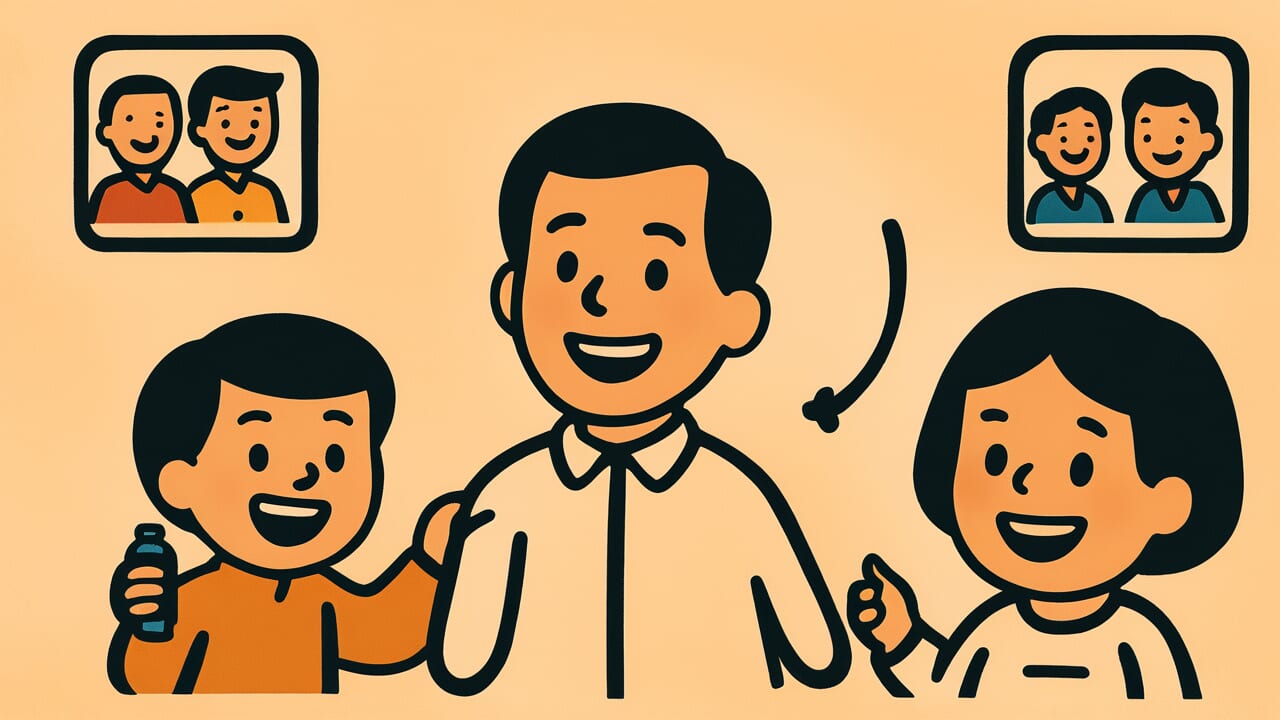How to Read “Parents of three children live with laughter”
Sannin komochi wa warōte kurasu
Meaning of “Parents of three children live with laughter”
This proverb means that families with three children live lively and joyful lives. When raising one or two children, parents often feel overwhelmed by the burden. But with three children, the kids play together and help each other. The house naturally fills with bright laughter.
From the parents’ perspective, by the third child they’ve gained experience in child-rearing. They can interact with more confidence and ease. Watching the children stimulate and grow with each other brings special joy. Life may be financially challenging, but the warmth and energy of the home more than makes up for it.
This proverb views large families positively and offers encouragement. Even today, people use it to share the bright side of raising multiple children. It speaks to families raising three or more kids, and to those considering having children.
Origin and Etymology
No clear written records document the origin of this proverb. However, people believe it has been passed down as folk wisdom since the Edo period.
The number “three” holds special meaning. In traditional Japanese thinking, three symbolizes stability and harmony. An only child feels lonely, and two siblings often fight intensely. But with three children, they have playmates among themselves. Parents can step back a bit.
The expression “warōte kurasu” is also interesting. It uses the old colloquial form “warōte” instead of the modern “waratte.” This shows the proverb came from everyday speech. Even in poverty, parents treasured the sound of children’s laughter above all else.
For common people in the Edo period, children were both labor and support for old age. Yet this proverb emphasizes the lively, joyful home atmosphere over economic factors. It expresses family bonds and joy that transcend the hardships of child-rearing. This is why it has remained in people’s hearts for so long.
Usage Examples
- They say parents of three children live with laughter, and it’s true—our house is lively and fun every day
- Having a third baby is tough, but parents of three children live with laughter, so I’ll keep going
Universal Wisdom
This proverb teaches a universal truth. Human happiness doesn’t depend only on wealth or convenience. Our ancestors understood that deep joy comes from human connections. It lives especially in family bonds and household liveliness.
The number three carries deep meaning. With two people, relationships often become confrontational. But three people create complex dynamics. Cooperation, compromise, and consideration develop naturally. Children learn not just from parents but from sibling relationships. These horizontal connections teach the basics of human interaction.
The proverb also teaches us the value of laughter. Laughter isn’t just entertainment. It’s the power to overcome difficulties and the glue that binds families together. Even in financial hardship, sickness, or disaster, people can survive if their family can laugh together. The proverb conveys this human strength and warmth.
Times change, but people still fear loneliness and seek connection. This proverb reminds us of a simple but easily forgotten truth. Happiness lives in liveliness.
When AI Hears This
With one child, all parental expectations concentrate on that single person. Both parent and child feel psychological pressure. If this child fails, it’s over. With two children, comparison emerges. The older one studies well but the younger doesn’t. The sister married but the younger one hasn’t. They fall into the trap of relative evaluation.
But with three children, an interesting phenomenon occurs due to cognitive limits. Comparing three people simultaneously overloads the brain. Parents unconsciously switch to individual evaluation. In other words, they begin seeing each child as an independent being. This creates psychological acceptance and simultaneously distributes expectations as risk hedging.
Consider the inverted U-curve from behavioral economics. Too few choices create anxiety. Too many cause exhaustion from management overload. Three is right at the cognitive limit for maintaining deep relationships simultaneously. Parents can watch everyone but don’t try to control everyone perfectly. This “just-right letting-go distance” emerges.
Probability theory offers another interesting point. With three children, parents feel optimistic that at least one will meet expectations. They also feel reassured that the probability of all three failing is low. This “resigned optimism” is the psychological mechanism that allows living with laughter.
Lessons for Today
This proverb teaches modern people that happiness lies in quality, not quantity. Regardless of how many children you have, building relationships where family members laugh together is what truly matters.
In modern society, many people hesitate to have children due to economic anxiety. Education costs and living expenses are certainly important concerns. But this proverb offers a different perspective. It reminds us of richness that money cannot buy. Liveliness, laughter, and family bonds.
The proverb also teaches the importance of an active attitude in “living with laughter.” Happiness won’t come if you just wait. Find small joys in daily life. Treasure moments of shared laughter. This positive mindset brightens any home in any situation.
Whatever your family size, you can build a warm home if you cherish smiles. This proverb gives us courage to believe in the power of family bonds and laughter.



Comments